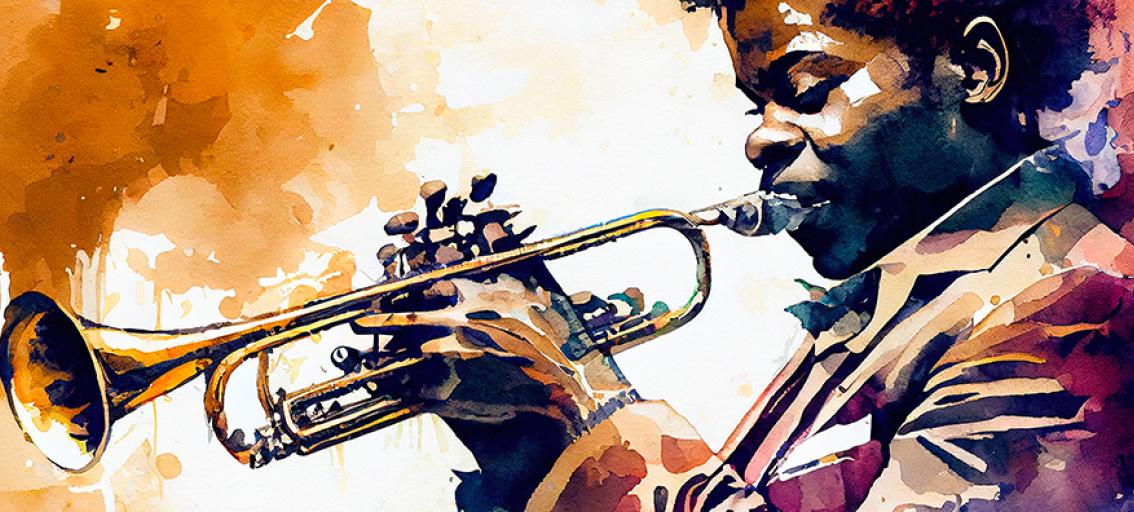Coming from the Same Horn
Wynton Marsalis is a living legend as a jazz trumpeter, bandleader, composer, arranger, and educator. He’s taught often about the birth of jazz music in New Orleans, and particularly about the collision of diverse worlds that created this new American art form.
When naming the elements that helped give birth to jazz, Marsalis points to the influence of sacred church music merging with the sound of the blues (itself a newer expression blending the cry of spirituals born out of slavery with the percussive rhythms of both African and Caribbean music):
Now, you have the people singing about getting the spiritual sound of the church and they also are getting that secular sound of the blues. And the musicians who could understand both of those things and put both of them in their horns side-by-side…(they) were the ones who could play. (Wynton Marsalis, interviewed for Ken Burns’ Jazz)
The wail of humanity in the blues. The transcendence of sacred hymns. The secular expression that is of this world. The reverence due to the God beyond this world.
Side-by-side. In the same horn. In the same sound.
It’s a vibrant, honest, gritty music that exults in the transcendent while staying grounded in the abrasive experiences that come with being human. In this sense, jazz music sincerely represents the human experience. Can our worship gatherings do the same?
Good Tension In Worship Planning
One of the beautiful challenges of planning worship for weekly congregational services is all of the tension that we need to manage. It’s difficult to create space in worship that holds up the glorious presence of God while also being honest about our human experience and all that comes with it—life is just as much about sin, failure, hurt, injustice, death as success, healing, righteousness, and wonder.
The effort is worthwhile, though: worship that is sincere with both realities can be deeply meaningful and ultimately transformative. As the Spirit leads our worship planning throughout a week or a season, we can create spaces for our congregation to bring the entirety of who they are into worship.
Our Creator already knows us intimately, and invites us into a genuine relationship with no need to hide. Worshiping together within that reality aims our hearts toward that end—being fully with God, and fully with the people of God with no barriers.
The Problem With Victory
In my particular cultural location, “victory” seems to be the main theme in both worship and daily life. This is generally true across the broader culture. We glorify what’s “successful” by the world’s standards and nobody likes a loser. It’s also generally true in how people interpret their faith: we are victorious because Christ is victorious, so let’s focus on that. What a glorious truth!
In a previous church where I served as a music director, I regularly led “three songs in the key of perpetually happy,” (as one of my friends put it). I was, however, approached by a congregant with a gentle complaint: my desire to always celebrate “success” and “victory” meant this congregant, who was suffering much in that season of life, really didn’t belong. There was no way to name their suffering in our worship, or find God present in the midst of her suffering while we worshiped together.
I needed to hear that. It changed the way I plan worship.
Heaven & Earth
Now I keep Wynton in mind. His description of sacred hymns and the wailing blues living side-by-side together in the music made by the greatest jazz musicians inspires me to think similarly.
Perhaps it’s worth skimming through your last few months of service orders, especially with your planning team if you have one, and asking, “Are there spaces here for both the splendor and the sorrow? For the otherworldly and the earthy? The holy and the human?”
In addition to the adoration of God, ask yourself:
- Where is there space for the sinner to ask forgiveness?
- Where is there space for the suffering to lament?
- Where is there space to name what is unjust?
- Where is there space for the sick to seek healing?
- Where is there space for the lost to be prayed for?
- Where is there space for the grieving to place their loss?
One great answer to each of these questions, of course, is simply the Psalms. If you spend time reading, praying, or singing the Psalms, it won’t take long to see all of these realities at home next to the outbursts of praise and trust. What a beautiful, ancient gift for just being human in worship!
Dissonance
Our faith is full of dissonance, the reality of upside-down things being true. The kingdom has come already, but also not yet. In our weakness, God is strong. The religiously devout are often the ones who are misguided. The one with power is called to serve. Wisdom looks like foolishness. We gain our lives by losing them. All of these and more have a home in our spaces of worship. Here’s Marsalis again:
In New Orleans…those people were living life and we say, in jazz music it says, this is what we do and it’s beautiful. And it’s also terrible. But that’s what gives our music its bite and its feeling. (Wynton Marsalis, interviewed for Ken Burns’ Jazz)
Meaningful worship—worship with bite and feeling to go with being biblically faithful and thoughtful—is honest, holding out the reality of our gritty, human experience and the presence of a holy God in the midst of it all. Planning for worship like that is complicated, but it is oh so beautiful!

